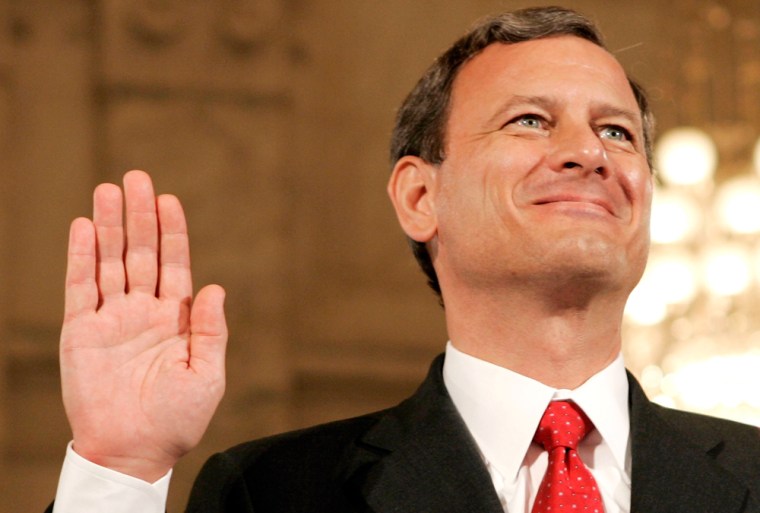How much did chief justice nominee John Roberts help or hurt himself in his brief opening statement at his Senate confirmation hearings Monday? Will any votes be pried away or cemented?
Allies and critics alike gave him credit for eloquence and sincerity in his opening speech, but after that the agreement ended.
“It almost moved me to tears,” said Sen. Jeff Sessions, R-Ala. of Roberts’s statement.
“The public saw a man they would be comfortable with judging them and their family, if they ever found themselves in a courtroom,” said Sen. Lindsey Graham, R-S.C. in a post-testimony analysis.
But Nan Aron, president of the Alliance for Justice, an advocacy group which opposes Roberts, said, “It was a very moving speech, but did not address the core issues that will be at the heart of this hearing.”
'Turn the clock back'?
Aron indicated the real work of the senators hadn’t yet begun: “It’s very important for the Democrats to probe his views on issues of racial equality and gender equality — to see if he will be a justice who accepts the progress that has been made on civil rights or whether he will turn the clock back.”
Aron saw as especially significant the letter signed by 17 Democratic senators demanding that the Bush administration turn over internal memos Roberts wrote serving as deputy solicitor general from 1989 to 1992.
The White House has refused to turn over the documents saying such a release would have chilling effect on all who work in the solicitor general’s office.
“It’s a very important statement — it certainly puts the White House on notice that it must be forthcoming with the Democrats,” Aron said.
And three of the Democrats signing that letter, Ken Salazar of Colorado, Mark Pryor of Arkansas and Joe Lieberman of Connecticut, were signatories of the “no filibuster except under extraordinary circumstances” accord of May 23.
How's the vote count?
If the Bush administration doesn’t turn over the documents and those three Democrats vote no, does it put Roberts’s nomination in jeopardy?
Not likely. He’d still likely get 52 or 53 out of the 55 Republicans to vote for him, plus perhaps a few Democrats.
The GOP doesn’t necessarily need any Democrats to get Roberts confirmed.
But Graham raised the prospect of Democratic filibuster (which only takes 41 votes to sustain).
With Salazar, Pryor and Lieberman, joining 38 other Democrats, they could pull off a filibuster.
“The confirmation hearings have always been about whether the president’s nominee will get an up-or-down vote. The only way he would not be confirmed is through a filibuster,” said Graham.
“After his opening statement today, I don’t think anybody will be able to mount a challenge that he is out of the mainstream, that he is the kind of person who should not be on the court because you should be afraid of him,” he added.
Graham pointed out that Roberts was the logical consequence of what happened on Nov. 2, 2004. “He’s a conservative. To expect George W. Bush to appoint anyone other than a conservative — you didn’t listen to the last two elections.”
In his statement, Robert played on a theme he used when he was up for confirmation in 2003 for his current appeals court job: humility.
“A certain humility should characterize the judicial role,” he declared.
“Judges have to have the humility to recognize that they operate within a system of precedent, shaped by other judges equally striving to live up to the judicial oath,” he said.
Not out to change the world
He offered himself as a plainspoken idealist from the prairie but one who was not out to re-make the world from his seat on the bench.
“Mr. Chairman, I come before the committee with no agenda. I have no platform,” he assured the committee. “Judges are not politicians who can promise to do certain things in exchange for votes.”
That last sentence seemed to telegraph that Roberts does not want to, or see a need to, "earn" the senators' votes and that he would make no implied, subtle, or cleverly veiled assurances on the right to privacy, abortion, property rights or any other topic in the next three days of testimony.
Two themes were conspicuously missing from Roberts’s opening statement but might emerge in his responses to questions during the rest of this week:
- a commitment to equal justice for rich and poor, and;
- a recognition of the power of Congress to make the laws and his willingness to defer, whenever possible, to the decisions made by Congress.
Roberts may be saving some of eloquence for answering senators’ questions.
He did underscore that the role he aspires to is defender of the third branch of government.
“If I am confirmed, I will be vigilant to protect the independence and integrity of the Supreme Court, and I will work to ensure that it upholds the rule of law and safeguards those liberties that make this land one of endless possibilities for all Americans,” he said.
One obvious Democratic question for Day Two: So, Judge Roberts, what do you include under "those liberties"?
The liberty set forth in the Supreme Court's landmark Lawrence v. Texas ruling in 2003, which gave constitutional protection to sexual relations between same-sex couples?
